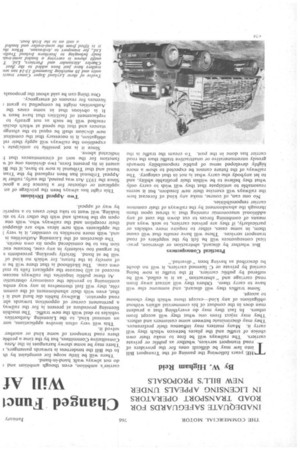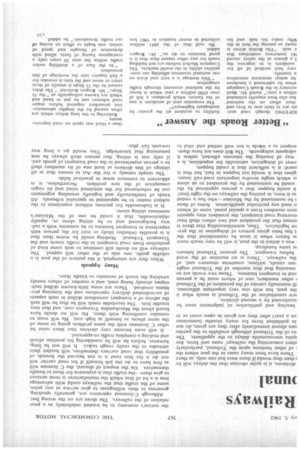Changed Fundi Railways )unal Will Af
Page 72

Page 73

If you've noticed an error in this article please click here to report it so we can fix it.
INADEQUATE SAFEGUARDS FOR ROAD TRANSPORT OPERATORS IN LICENSING APPEALS UNDER NEW BILL'S PROPOSALS By W. Higham Reid
THE years following the passing of the Transport Bill into law may be difficult ones for the providers of road transport services, whether as public or private carriers. The railways will be free to make their own choice of traffic and the places between which they will carry it. Many matters may influence their preferences. They may discriminate between some customers and others. They may reject from one what they will accept from others. In fact they may do everything that a prudent man does in the conduct of his commercial affairs without obligations of any kind—except those which they choose to accept.
Some traffics they will discard, and someone else will have to carry them. Others they will attract away from road carriage and " abstraction " as it is called, will be suffered by public carriers. If the traffic is now being carried by private or C licensed carriers, it will no doubt be described as having been "diverted."
Practical Consequences
But whether by discard, abstraction or diversion, practical consequences will be felt by the suppliers of road transport services. These will have results that will cause them, in some cases, either to require more vehicles or particularly, if they are private carriers, to seek ways and means of combining forces to cut down the cost of any additional uneconomic running that is thrust upon them through the abandonment by the railways of their common carrier responsibilities.
No one can, of course, make any kind of forecast how the railways will exercise their new freedom, but it seems reasonable to anticipate that they will wish to carry only what they believe to be within their profitable ability, and to let anybody else carry what is not in that category. The railways of the future cannot be expected to show a more highly developed sense of public responsibility towards grossly unremunerative or unattractive traffic than the road carrier has done in the past. To cream the traffic is the carrier's ambition, even though ambition and I do not always walk hand-in-hand.
There will be little scope for complaint by th In the Bill the tenderness is towards passengers, ; There may be some showy harangues in the Area Consultative Committees, but by the time a proble there road transport of some kind or another solved it.
This will very often involve applications, sorr an unusual kind, to the Licensing Authorities vehicles to deal with the new traffic. The machin licensing procedure at present is for the railwa} a permanent corner of opposition towards alrr road operator. Railway habits die hard and it i that, even with their abandonment of the comm role, they will feel themselves in any way emba continuing to provide the customary obstructio At these public inquiries the railways succeel succeed at all) because the applicant fails to mal own case. The likelihood is that there will be n of novelty in the future, for which no kind of will be at hand. Strictly speaking, precedents s be argued too violently in any case, because eac tion has to be considered upon its own merits.
The discretion of the Licensing Authorities is and, with more novelties to consider, it is very 1 the applicants with new ideas who are disappoi their reception and the railways who, with one open up the breach and with the other try to stc
leaking, will want to take their cases to a superic by way of appeal.
Two Appeal Divisions
This right has always been the privilege of an applicant or objector for a licence for a good Since the 1933 Act was passed, the early, rather le Appeal Tribunal has been replaced by the Tran bunal and that Tribunal is now to have, if the Bi assent in its present form, two divisions one of NA
function for the sort of circumstances that Iindicated above.
Since it is not possible to anticipate N expedition the railways will apply their rel obligation, it is necessary that the constitut new division shall be equal to the change stances and that the speed at which decisic reached will be such as not greatly to replacement of facilities that have been in It is obvious that in some cases the Authorities might be compelled to grant licences for reasons of emergency.
One thing can be said about the proposals divisions, it is quite obvious that the delays will be ; than they would if there were but one only, as there There have been many cases in the past where the : of other business upon the Tribunal, particularly itters concerning the railways' rates and fares, has quite unreasonable delays to the appellants. The Us of the Tribunal although available to the parties tses almost immediately after they are given, do not in published form for many months (sometimes an a year) after they are given in open court or in hearing and publication of judgments must be accelerated by a second division.
sew constitution of the Tribunal is much what it the past, but with one very important difference. ill nominally consist of the president of the Tribunal other members, one of whom must be a person teed in transport business. Those two words are so meaning that that member of the Tribunal might -om canals, airlines, coastwise steamers and, of the railways. There is no mention of the word before transport. The present Tribunal labours se same handicap,
was a defect in the past, it will be very much more se future when it must be remembered that the t has been given powers of delegation in the prow legislation. Thus, notwithstanding that there is ernent that the president and two others shall hear ncerning road transport, the president may appoint nore members from a special panel, none of whom o need any particular qualification. Some of these be nominated by the Minister—who has a vested as it were, in putting the railways on the right lines! it could happen that a person appointed by the could be nominated by the president to sit alone ie which might involve important road-rail issues. gines that it would not happen in fact, but that is ;uard: it is sufficient that it could happen.
ower of delegation, admirable for expedition, is a way of treating the interests affected, unless: it adequate safeguards. The Bill does not have them. anSport as a whole is too well settled and vital to
the nation's economy to be treated indefinitely as a poor relation of the railways. The shoes are on the wrong feet.
Although C-licensed operators are, generally speaking, generous in their willingness to give service at any price, some of the traffic that the railways could with advantage lose is a lot of that which the manufacturer is most anxious to give them—the traffic that is expensive for them to handle themselves. On the impact of discard, the C licensee will at first have to do the job himself if his road carrier will not do it for him (and it is not beyond the bounds of possibility that road carriers themselves, will harden their attitudes to the really rough tasks). It will not be -long, however, before he will be considering his position afresh and making a complete traffic re-appraisal.
It will soon become very obvious that there must be other C licensees with the same problem going to some of the same places as himself at high cost. He will want to consider combining with them. He will no doubt have heard about the Merchandise Transport case, and that may trouble him. The inevitable result will be that he will seek the advice of a transport consultant skilled in such aspects of co-ordinated delivery operations and the licensing problems involved. There are some little-known skilled techniques already being used, and a number of others merely awaiting the touch of necessity to kindle them.
Many Appeals When they are attempted, if the pattern of the past is a reliable guide, one side or the other will appeal. The railways will no doubt still continue to seek some kind of protection from road transport in the traffic courts and the Transport Tribunal. Nothing could be worse than that it is possible (whether likely or not) for the person with experience in transport business to be someone with a railway background and to be sitting alone or, equally objectionable, that it could be one of the Minister's nominees sitting alone.
It is fashionable for persons without experience in the subject matter to be appointed to specialist tribunals. All kinds of intellectually and logically sounding arguments can be volunteered for the untainted mind and its virgin conception of the new problem. Nevertheless, it is abhorrent to common sense in practical fields.
The simple remedy is for the Act to ensure that at all sittings of this division at least one of its members shall be a person experienced in the road transport of goods and, if only one is sitting. that .person shall always be one possessing that knowledge. This would go a long way towards fair play.




























































































































